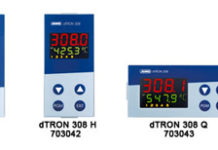Overview
The model 5113 is a high performance, low noise voltage preamplifier with continuously adjustable gain and selectable high, low or bandpass filtering. Its input can be configured for either single-ended or true differential operation with either DC or AC coupling, and its output will deliver up to 1 V pk-pk into a 50 Ω load.
All the principal instrument controls are operated via the three front-panel rotary knobs with a back-lit LCD display to show their present settings. The instrument also includes an optically isolated bi-directional RS232 interface allowing remote operation and interrogation of all controls. Since in some experiments even the very low levels of noise introduced by the internal microprocessor that supports these capabilities may cause problems, the unit includes a "sleep" function whereby every source of digital noise is turned off after a predetermined interval. When in the sleep mode the preamplifier "wakes up" as soon as any control is adjusted and goes back to sleep when adjustment is complete.
The instrument can either be continuously line-powered from the model PS0108 power supply supplied with it, or be run from the internal rechargeable batteries which are charged whenever the power supply is connected. Battery operation often allows troublesome line frequency pick-up to be eliminated, as well as permitting operation away from a source of line power.
If the signal of interest is limited to a single frequency or narrow range of frequencies then the filters allow selective signal amplification, making subsequent signal measurement, for example on an oscilloscope or a lockin amplifier, easier. The filters can of course be switched out of use to give a flat frequency response.
The model 5113 will be of use in applications as diverse s radio astronomy, audiometry, test and measurment, process control and general purpose signal amplification as well as being ideally suited to work with our range of lock-in amplifiers.
Specifications
General
DC or AC coupled voltage amplifier with adjustable gain and a maximum freguency response extending from DC to 1 MHz. Single-ended or differential high-impedance input, and single-ended output, via BNC connectors.
Signal channel high and low pass filters with variable cut-off frequencies and slope may be switched into circuit to give an overall low-pass, high-pass, bandpass or flat response.
Computer control via optically isolated RS232 interface.
Battery powered from internal rechargeable batteries, which recharge when separate line power supply is connected.
| Inputs | |
| Modes | A or A-B |
| Coupling | AC or DC |
| Impedance AC coupled DC coupled |
either 10 MΩ or 100 MΩ in parallel with 25 pF and in series with 0.1 µF either 10 MΩ or 100 MΩ in paralled with 25 pF |
| Max input without Damage DC coupled AC coupled |
+ 10 V, -9 V |
| Max input for Linear Operation Common mode Differential mode |
1 V peak. See Table 1 |
| Common Mode Rejection Ratio, CM.R.R. DC to 1 kHz 1 kHz to 1 MHz |
>120 dB |
| Gain | Coarse gain of x5 to x50,000 in 1-2-5 sequence with an accuracy of 1%. Fine gain extends range from x1 to x100,000 with an accuracy of 2%. An uncalibrated vemier provides gain adjustment of +20% of coarse gain |
| Overload Recovery | Front-panel push button or computer command |
| Voltage Noise | Typically 4 nV/√Hz at 1 kHz referred to input – see also noise contours on page 11 |
| Filters | |
| Type | One high-pass and one low-pass stage |
| Mode | Low-pass, High-pass, Bandpass, Flat (No filter) |
| Slope Low pass High pass Bandpass |
6 or 12 dB/octave 6 or 12 dB/octave 6 dB/octave |
| Frequency Response Flat Mode Low-pass High-pass |
DC to 1 MHz. |
| DC Drift | |
| Referred to Input (DC coupling) | Maximum 10µ/º or less than 10 µV/º c or less than 10µV per 24 hours at constant ambient temperature |
| Referred to Output (AC coupling) | |
| Course gain only With Fine Gain |
75 µV/º C 250 µv/º C maximum |
| DC Input Offset Control | Front-panel screwdriver control provides for DC zeroing |
| Output | |
| Max Output Voltage | 2 V pk-pk ahead of 50 Ω |
| Output imipedance | 50 Ω ± 2 % |
| Computer Interface | |
| Type | Opto-isolated RS232 |
| Connector | DB25 25-pin female connector |
| Baud Rate | 300 to 9600 baud |
| Parameters | No parity, eight data bits and one stop bit |





















Comments are closed.